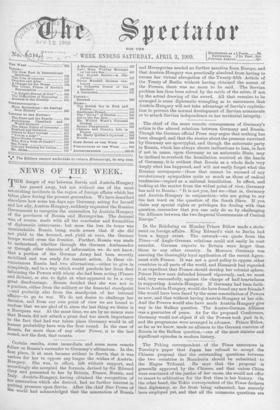NEWS OF THE WEEK.
T. danger of war between Servia and Austria-Hungary has passed away, but not without one of the most astonishing incidents in the region of foreign affairs which has taken place during the present generation. We have described elsewhere how some ten days ago Germany, acting for herself and her ally, Austria-Hungary, suddenly requested the Russian Government to recognise the annexation by Austria-Hungary of the provinces of Bosnia and Herzegovina. The demand was, of course, made with all the courtesies and formalities clf diplomatic intercourse ; but none the less its tenor was unmistakable, Russia being made aware that if she did not yield to the demand, and yield at once, the German troops would cross the frontier. Further, Russia was made to understand, whether through the German Ambassador or through other channels of information we do not know, that a portion of the German Army had been secretly mobilised and was ready for instant action. In these cir- cumstances Russia had two alternatives,—either to give in completely, and in a way which would preclude her from first informing the Powers with whom she had been acting (France and Britain), or else to fight at what appeared to be a very great disadvantage. Russia decided that she was not in a position, either from the military or the financial standpoint —and probably also from the standpoint of her internal affairs—to go to war. We do not desire to challenge her decision, and from our own point of view we are bound to Confess that we are glad of it, since the last thing we desire is a European war. At the same time, we are by no means sure that Russia did not attach a great deal too much importance to the fact that had war taken place Germany would in all human probability have won the first round. In the case of Russia, far more than of any other Power, it is the last round, not the first, that counts.










































